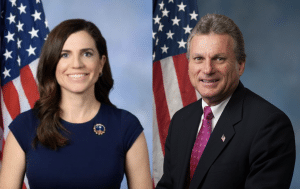News
U.S. Reps. Buddy Carter and Nancy Mace Secure Passage of FDA Modernization Act
This week, the House Energy and Commerce Committee passed the FDA Modernization Act, H.R. 2565 and S. 2952, as a rider to a larger package of FDA-related reforms, strengthening the chance of enactment this summer for a measure that would eliminate a statutory animal testing mandate for new drug development and reform our drug approval process.
The Center for a Humane Economy, Animal Wellness Action, the Animal Wellness Foundation, the Michelson Center for Public Policy, National Medical Association, Emulate Inc., and dozens of other organizations and corporations in a “Modernize Testing” coalition applauded the action. The FDA Modernization Act is included as Section 701 in a legislative package known as the Food and Drug Amendments, H.R. 7667, which includes key provisions to reauthorize FDA user fee agreements. H.R. 7667 passed the Committee this week by a vote of 55 – 0.
“The FDA Modernization Act will lead to safer, more effective drugs without unnecessary animal suffering,” said Rep. Buddy Carter, R-Savannah. “By cutting the FDA red tape, we can create a medical industry that is more humane and better poised to provide life-saving aid.”
“The current drug development model is broken; the House Energy and Commerce Committee agrees,” said Rep. Nancy Mace, R-Charleston. “The FDA Modernization Act not only passed unanimously out of Committee, but it’ll soon be before the full House. I am confident my colleagues will join me in expanding ways researchers can test a drug’s safety without having to rely on animal testing.”
“We applaud Reps. Carter and Mace for their tremendous leadership in helping rollback this outdated burdensome federal mandate that unnecessarily harms animals, and increases both drug prices, and time to market,” said Marty Irby, executive director at Animal Wellness Action. “The bipartisan FDA Modernization Act appears to be the best shot at getting animal protection legislation enacted in 2022, and we are elated to see swift movement on this Animal Wellness Action-conceived measure that is a win-win for everyone, most importantly the animals we care so deeply about.”
“Leaders of the Energy and Commerce Committee, and other lawmakers from both parties, recognize that the United States must lift an archaic animal-testing mandate for drug development and replace that strategy with 21st-century methods grounded on human biology,” said Wayne Pacelle, president of the Center for a Humane Economy.
Rep. Carter, a pharmacist and Member of the House Energy and Commerce’s Health Subcommittee, as well as the full Committee, joined in bipartisan fashion with key Democrats to lead the effort in Committee, and is credited with securing the inclusion of the FDA Modernization Act in the larger piece of legislation. Neighboring Rep. Mace from just over the state line in South Carolina, is one of the leaders of the stand-alone legislation first introduced in April of 2021 with Rep. Vern Buchanan, R-Fla., Elaine Luria, R-Va., and others. The FDA Modernization Act was also introduced in the Senate for the first-time in October of 2021 by bipartisan Sens. Rand Paul, R-Ky., Cory Booker, D-N.J., Mike Braun, R-Ind., John Kennedy, R-La., and Ben Ray Lujan, R-N.M., and the rider has also been included in the discussion draft of the Senate’s larger FDA reauthorization measure as well.
The existing drug development paradigm, established by statute in 1938 under the Federal Food, Drug, and Cosmetics Act (FFDCA), relies on animal tests to determine if they are safe and effective for humans. It has a 95 percent failure rate in human clinical trials. Data show that it typically takes 10 to 15 years and an investment of an average of $1 billion and up to $6 billion for a new drug. This antiquated process of pharmaceutical innovation slows delivery of palliatives and cures for patient groups, drives up drug costs, and sacrifices countless animals, including mice, rats, dogs, and non-human primates.
The legislation has been endorsed by more than 140 organizations and companies, including the National Medical Association, the National Hispanic Medical Association, Teva Pharmaceuticals, Emulate, Nortis Bio, Beyond Celiac, the San Francisco AIDS Foundation, the United Leukodystrophy Foundation, Myositis Association, SPCA International, the Progressive Animal Welfare Society, and Pasado’s Safe Haven.
–
Animal Wellness Action is a Washington, D.C.-based 501(c)(4) organization with a mission of helping animals by promoting legal standards forbidding cruelty. We champion causes that alleviate the suffering of companion animals, farm animals, and wildlife. We advocate for policies to stop dogfighting and cockfighting and other forms of malicious cruelty and to confront factory farming and other systemic forms of animal exploitation. To prevent cruelty, we promote enacting good public policies and we work to enforce those policies. To enact good laws, we must elect good lawmakers, and that’s why we remind voters which candidates care about our issues and which ones don’t. We believe helping animals helps us all.
The Animal Wellness Foundation is a Los Angeles-based private charitable organization with a mission of helping animals by making veterinary care available to everyone with a pet, regardless of economic ability. We organize rescue efforts and medical services for dogs and cats in need and help homeless pets find a loving caregiver. We are advocates for getting veterinarians to the front lines of the animal welfare movement; promoting responsible pet ownership; and vaccinating animals against infectious diseases such as distemper. We also support policies that prevent animal cruelty and that alleviate suffering. We believe helping animals helps us all.
The Center for a Humane Economy is a non-profit organization that focuses on influencing the conduct of corporations to forge a humane economic order. The first organization of its kind in the animal protection movement, the Center encourages businesses to honor their social responsibilities in a culture where consumers, investors, and other key stakeholders abhor cruelty and the degradation of the environment and embrace innovation as a means of eliminating both.

























